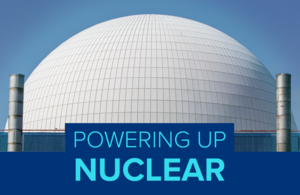
The UK will become the first country in Europe to launch a high-tech HALEU nuclear fuel programme, strengthening supply for new nuclear projects and driving Putin further out of global
energy markets.
The landmark £300 million investment is part of plans to help deliver up to 24GW of clean, reliable nuclear power by 2050 - a quarter of the UK’s electricity needs.
The government funding will support domestic production of high-assay low-enriched uranium (HALEU) - the specialist fuel required to power the next generation of nuclear reactors. Most advanced reactors require this fuel that is currently only commercially produced in Russia.
The launch of the HALEU programme will enable the UK to supply the world with specialist nuclear fuel and further isolate Putin’s Russia.
An additional £10 million will also be provided to develop the skills and sites to produce other advanced nuclear fuels in the UK, helping to secure long term domestic nuclear fuel supply and support international allies.
This builds on the UK’s status as a world leader in the production of nuclear fuels, with domestic capability in uranium enrichment and in fuel fabrication in the North-West of England.
Secretary of State for Energy Security and Net Zero, Claire Coutinho, said:
We stood up to Putin on oil and gas and financial markets, we won’t let him hold us to ransom on nuclear fuel.
Britain gave the world its first operational nuclear power plant, and now we will be the first nation in Europe outside of Russia to produce advanced nuclear fuel.
This will be critical for energy security at home and abroad and builds on Britain’s historic competitive advantages.
These plans will help build new supplies of affordable and clean domestic power so the transition to net zero doesn’t mean higher prices, protecting households from global instability.
Advanced modular reactors will play an important role in the UK’s nuclear revival as, like small modular reactors, they are smaller, can be made in factories, and could transform how power stations are built by making construction faster and less expensive. Many designs have the potential for a range of applications beyond low-carbon electricity generation, including production of hydrogen or industrial heat.
With the first plant scheduled to be operational in the early 2030s, the funding will boost the North West of England’s nuclear fuel production hub, supporting local industry and jobs while helping to expand our nuclear revival in the UK and overseas – vital to meeting global net zero targets.
This builds on the UK’s work to displace Russia from the global nuclear fuels market, particularly in uranium conversion services, where government and industry are together investing up to £26 million to bring this capability back to the UK by the end of the decade.
At COP28 the UK also restated its commitment to working with G7 nuclear partners to reduce global dependence on Russian fuel.




































